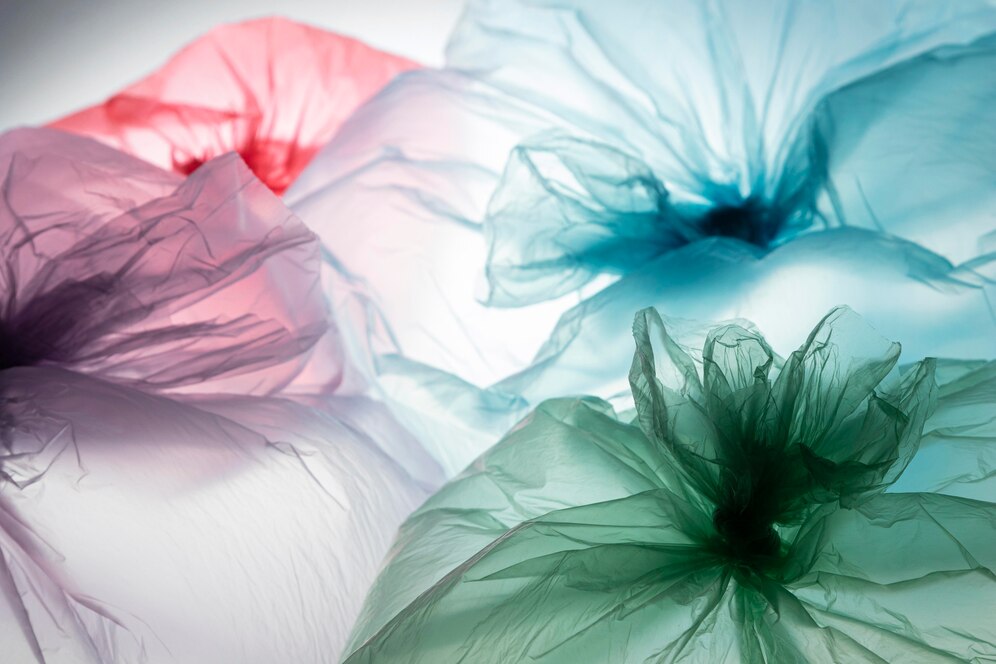Polythene bags, commonly known as plastic bags, are a versatile staple used across many industries. These bags are made from polyethylene, one of the most common types of plastic polymers.
What makes polythene bags so popular? For starters, they are highly affordable to produce, making them cost-effective for all types of businesses. Polythene bags are also durable enough for most applications. Even though the plastic is thin and lightweight, the bags can securely hold a surprising amount of weight without tearing.
The best part about polythene bags is how versatile they are. The same material can be used to package food products, transport medical supplies, or display retail goods. With the right custom printing, these ordinary plastic bags can even double as branding tools.
Polythene bags come in a range of styles, thicknesses, and colors. Standard polyethylene formulations are transparent, allowing the contents to be visible. But specialized pigments can create colored bags as well. Thicker bags around 4-6 mils are very sturdy, while thinner 1-2 mil bags are best for lightweight items. Ultimately, polythene offers endless possibilities for protecting, preserving, and promoting products across industries.
Major Industries that Use Polythene Bags

Let’s take a look at some of the most common uses of poly bags across different industries.
Food Production and Processing
The food and beverage industry relies heavily on polythene bags for packaging purposes. In food production facilities, polythene bags are filled with raw ingredients like grains, flour, sugar, and powders. The bags protect these dry goods from moisture, insects, and contaminants during storage and transport.
Once ingredients are processed into prepared foods, polythene bags serve as primary packaging to contain the products. For example, sliced bread loaves are slipped into clear polyethylene bags before being loaded onto store shelves. The bags prevent the bread from drying out and extend its shelf life. They also provide tamper-evident security.
For food processing companies, it is critical that the polythene bags meet food safety standards. Bags that will directly contact edibles must be made from food-grade polyethylene resin free of toxic chemicals. Most facilities require bags to be certified for food use by organizations like the FDA.
Medical Supplies and Medications
Polythene bags play several important roles in medical and healthcare settings. One key application is packaging medications and pharmaceuticals. Some medicines are sensitive to UV light exposure, which can degrade their chemical components. Special polythene bags with UV-blocking properties help prolong the potency and efficacy of these light-sensitive drugs.
Bags also provide sterile packaging for medical devices and instruments like scalpels, forceps, and syringes. Items are first sterilized, and then sealed in polyethylene bags to maintain sterility until use. This prevents contamination and allows safe usage inside operating rooms or during minor procedures.
Anti-static polythene bags may be used to protect electronics like defibrillators and monitors that are vital for patient care. The antistatic properties prevent the buildup of static charge that could potentially damage sensitive medical equipment.
Overall, the versatility of polythene enables it to package and protect all kinds of medical supplies and medications. Properly formulated polyethylene bags help ensure healthcare products remain sterile and effective when needed most.
Waste Disposal
In healthcare, polythene bags play a critical role in safe medical waste disposal. Hospitals generate tons of hazardous biohazardous waste, from used needles and bloodied bandages to removed tissue samples. Sturdy polyethylene bags contain this dangerous waste so it does not leak or contaminate facilities or personnel.
Medical waste bags are specially designed with higher thickness and puncture resistance. Tight heat sealing and proper bag closure containing waste are essential. Color-coding and biohazard labels identify the bags for proper hazardous material disposal.
The agricultural industry also relies heavily on polythene bags. On produce farms, fruits and vegetables are packaged in polyethylene bags for harvest and transport. The bags protect fresh produce from bruising and mechanical damage. They also retain moisture and prevent premature dehydration.
Polythene bags enable the sanitary collection of animal waste and other organic matter for conversion into fertilizers. Durable construction resists rips, even when loaded with heavy compost ingredients.
Harvesting and Storage of Produce
Polythene bags are ubiquitous during the harvesting and post-harvest storage of fruits and vegetables. Clear polyethylene bags are slipped over ripening crops like bananas and avocados while still on trees and vines. This protects the developing produce from pests, moisture, sun damage, and contamination.
Once harvested, fresh produce is quickly sorted and packaged into polythene bags for transport and storage. The bags create a microclimate that retains moisture and helps extend shelf life during storage or transport over long distances. Perforations allow ventilation while still deterring pests.
Properly sealed polythene bags prevent contamination from dirt, debris, and microbes. This enables safe storage of clean produce ready for distribution to grocery retailers. Without protective polythene packaging, fresh fruits and vegetables would be at risk of physical, pest, and disease damage. The bags are indispensable for maintaining peak freshness and quality.
Farm Waste Collection
On farms, polythene bags provide a sturdy vessel for collecting animal manure and organic waste to be composted into fertilizer. The thick polyethylene construction resists tearing or ruptures even when loaded with heavy wet waste. Farmers can gather cow manure, spoiled hay and silage, and other compostable ingredients into large polythene bags for transfer to compost heaps.
In the retail industry, polythene bags fulfill a variety of functions. Clear polyethylene bags are ideal for product packaging, allowing customers to see the items inside. Retail goods from clothing to craft supplies are neatly contained in resealable poly bags. This keeps merchandise organized and protected during transport from warehouses to store shelves.
Department stores and boutiques often package customer purchases in printed polythene bags emblazoned with store logos and branding. This serves as a walking advertisement for the retail brand. The bags also provide an inexpensive but effective carrying solution for customers.
Product Packaging and Display
In retail stores, clear polythene bags are the perfect packaging for showcasing products. Clothing folded neatly into transparent polyethylene bags is easily visible to browsing shoppers. The bags keep garments clean and dust-free while allowing customers to discern colors, patterns, and styles without opening.
Poly bags also showcase non-apparel merchandise like craft components, hardware items like screws and washers, and more. Product visibility in transparent polythene promotes sales. The bagged items appear organized and can be stocked or hung on pegboards or racks.
Another advantage of polythene bags for retail is the opportunity for custom printing. Bags can be printed with store logos, branding, and promotional designs in vivid color. Every time a customer gets handed a printed polythene bag at checkout, it reinforces brand recognition. Special seasonal or holiday designs can further boost brand image.
Polythene bags fulfil the twin purposes of protecting products while promoting them through visibility and branding. Their versatility explains the dominance of poly bags across retail settings from boutiques to big box stores.
Considerations When Choosing Polythene Bags
When choosing polythene bags, it is important to match the bag properties to your specific application and industry. Don’t forget to take into account the weight and durability needs of your application. Lightweight 1-2 mil bags work for packaging low-mass items like clothing or craft supplies. Heavy produce shipments and dense waste require thicker 4-6 mil bags that won’t rip or puncture under loads.
Consider sustainability factors like recyclability and recycled content when comparing bag formulations. Look for polythene made using renewable feedstocks or plastic diverted from landfills. Some novel bioplastic bags also compost or degrade faster than conventional polyethylene.
For retail and branding purposes, custom printing onto polythene bags provides endless design possibilities. Vibrant graphics and logos can be printed onto the bag surface. From bulk orders to small minimums, many polythene bag suppliers offer affordable printing options.
Read Also:























